|
|
|
Sort Order |
|
|
|
Items / Page
|
|
|
|
|
|
|
| Srl | Item |
| 1 |
ID:
157357


|
|
|
|
|
| Summary/Abstract |
The Second Hague Conference of 1907 is widely regarded as a turning point in the evolution of international society. Constructivist and English School accounts, in particular, highlight the active role played by Latin American delegates in advocating the principles of sovereign equality and nonintervention. I argue that this common interpretation erroneously relies on a retrospective reading of the “norm entrepreneurship” of Latin American states. Rather than aiming to transform the hierarchical international order of the time, foreign policy elites from Latin America sought to use the conference as a platform for increasing their countries’ status. Because of their comparative lack of resources, smaller powers will often try to pursue status through diplomacy and the use of international law, and their status gains in multilateral settings depend on the acquiescence of higher-ranked states. This explains both the diplomatic posturing of Latin American delegates at The Hague and their failure to make substantive status gains.
|
|
|
|
|
|
|
|
|
|
|
|
|
|
|
|
| 2 |
ID:
157350
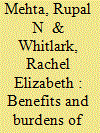

|
|
|
|
|
| Summary/Abstract |
How does the acquisition of latent nuclear capabilities—in the form of enrichment and reprocessing facilities—affect a state’s military security and bargaining power? On the one hand, nuclear latency might serve as a “virtual deterrent” against would-be aggressors, as well as a bargaining chip in international negotiations. On the other hand, some research holds that states cannot deter military challenges without at least a deliverable nuclear device. Other scholarship suggests that a state’s pursuit of latency invites nonproliferation sanctions and preventive strikes. We address this debate by quantitatively investigating the conditions when latency benefits or burdens states in their international interactions. To do so, we analyze a dataset of latency measures and a variety of military and bargaining outcomes. The results suggest that latency invites coercion without producing deterrence. Our findings imply that post–Joint Comprehensive Plan of Action (JCPOA), latency is more likely to undermine Iran’s economic and military well-being than it is to benefit its prosperity or security. That, in turn, suggests that the JCPOA will not increase Iran’s deterrent capability or its international influence, a fact that should temper fears about the negative consequences of the agreement.
|
|
|
|
|
|
|
|
|
|
|
|
|
|
|
|
| 3 |
ID:
157363


|
|
|
|
|
| Summary/Abstract |
Why do some postconflict states return to violence, while others remain at peace? Analysts increasingly credit postconflict justice institutions—such as truth commissions, amnesties, reparations, and trials—with contributing to the prevention of conflict recurrence following civil wars. But scholars remain divided about the overall effectiveness of these varied institutions. In this article, we directly engage this debate. We seek to overcome theoretical and data limitations that make it difficult to address the relationship between justice institutions and the likelihood that conflict will recur. We find that only postconflict justice processes that lessen conflict-induced grievances, and thus address individual motivations to rebel, are successful at keeping the peace. In a series of statistical tests using new data on postconflict justice from 1946 to 2006, we find strong support for the role of motivation-addressing processes in reducing conflict recurrence.
|
|
|
|
|
|
|
|
|
|
|
|
|
|
|
|
| 4 |
ID:
157352


|
|
|
|
|
| Summary/Abstract |
Leaders generally conduct diplomacy through relatively autonomous agents. I argue that delegating diplomacy allows for credible communication by constraining leaders’ ability to bluff. Specifically, leaders can choose diplomats who place some value on the interests of their host countries. Such diplomats will only oppose foreign government policies when these impose large costs on their home country. Consequently, a message from such a diplomat enjoys greater credibility than one from a diplomat whose preferences mirror those of the leader. This gain in credibility increases the leader’s chances of obtaining concessions when the diplomat opposes foreign policies and reduces the probability of conflict. I show formally that, for the leader, the optimal diplomat is always biased in this way because the increased credibility offsets the diplomat’s occasional failure to support the leader’s position. I conclude with a case study focused on the career of Ambassador Walter Hines Page.
|
|
|
|
|
|
|
|
|
|
|
|
|
|
|
|
| 5 |
ID:
157351


|
|
|
|
|
| Summary/Abstract |
Do norms constrain states’ foreign policies even in the face of strong economic incentives to ignore them? Arms exports provide an excellent opportunity to examine this question more closely. They regularly spark fierce political debates on whether to trade goods that buyers might deploy with devastating effects. We use the case of German arms exports to provide an in-depth statistical analysis of the behavior of a major arms exporter that claims to follow high normative standards. In particular, we investigate to what extent domestic, supranational, and international rules and norms shape German decisions about the destination and volume of major conventional weapon deliveries. Using panel data for the period 1953–2013, we employ a Heckman selection model to capture the two-step nature of the decision-making process. We find that German arms export policies often fail to comply with standards that prohibit exports to countries embroiled in military conflicts, civil wars, or with strong human rights violations. Furthermore, we discover, however, that the country fully complied with multilateral arms embargoes after 1990. We conclude that the noneffectiveness of certain rules and norms stems from both the ambiguity of norms and the opacity of decision-making processes.
|
|
|
|
|
|
|
|
|
|
|
|
|
|
|
|
| 6 |
ID:
157355
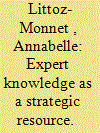

|
|
|
|
|
| Summary/Abstract |
This article asks how international secretariats can sometimes expand their authority in areas that relate neither to their mandate, nor to their sphere of expert authority. Existing explanations of mission creep assume that IOs act autonomously and expand in those areas that connect with their mandates, sense of organizational mission, and sphere of expert authority. The claim here is that entrepreneurial bureaucrats can succeed—in the absence of policy deadlock among states—in creating creep in unexpected issue domains through the mobilization of external expertise. The article examines this dynamic in the domain of bioethical standards. It shows that UNESCO acted as a first mover in the field, despite having no relevant expertise, and despite bioethics being more closely connected to the mandate of other organizations. Entrepreneurial bureaucrats within UNESCO were able to create creep in bioethics by mobilizing external experts in the field and capturing their skills. Working with external experts endowed their organization with the capacity to act, gave epistemic authority to their actions, and prevented the politicization of debates in a potentially controversial issue domain. In pointing to the strategic uses of expertise, the article challenges the commonly held view that expert knowledge acts as a means of solving problems and rationalizing global governance.
|
|
|
|
|
|
|
|
|
|
|
|
|
|
|
|
| 7 |
ID:
157366
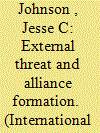

|
|
|
|
|
| Summary/Abstract |
Scholars generally believe that external threats drive military alliances. However, existing statistical studies of alliance formation fail to find a consistent relationship between the two. In this research note, I argue that this is because they do not correctly proxy for the existence of an external threat. Previous studies employ measures based on past militarized disputes, but a valid measure must capture expectations of future militarized disputes. To identify a better indicator of external threat, I situate alliance formation in crisis bargaining theory. The framework suggests that a target will be more likely to seek an alliance as its challenger’s probability of winning in war increases. I test this hypothesis and find a positive relationship between external threat and alliance formation. My analysis provides support for a central pillar of alliance theorizing. Additionally, it suggests that any pacifying effects of alliances may be difficult to uncover, as alliances form when the probability of conflict is already high.
|
|
|
|
|
|
|
|
|
|
|
|
|
|
|
|
| 8 |
ID:
157362
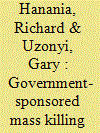

|
|
|
|
|
| Summary/Abstract |
Why do civil wars reoccur? Some scholars emphasize the role of post-war factors, while others locate the causes of civil war recurrence in the dynamics of the conflicts themselves. We build a theory that bridges these arguments by focusing on mass killing. We argue that government mass killing during war reduces opportunities for the opposition to return to military conflict in the future. This allows for longer periods of post-conflict peace. However, government atrocities that begin after the end of a civil war create new grievances without diminishing the ability of opponents to fight. This makes a faster return to conflict more likely. Statistical analysis of all civil wars between 1946 and 2006 strongly supports our arguments, even when we account for selection effects regarding when governments are more likely to engage in mass killing. These results reveal that both during-war and post-war tactics influence civil war recurrence, but that the same tactic can produce different effects depending on the timing of its use.
|
|
|
|
|
|
|
|
|
|
|
|
|
|
|
|
| 9 |
ID:
157360


|
|
|
|
|
| Summary/Abstract |
The firms that compose a typical American industry regularly part ways over trade policy, choosing to lobby or publicly comment on their own rather than collectively via their industry association. Emphasizing the importance of firm heterogeneity in global engagement, I consider the role of multinationalization and global sourcing in generating these disagreements. Each of these explanations for industrial fragmentation is supported with evidence on position-taking and lobbying from all US trade agreements since the North American Free Trade Agreement (NAFTA), as well as lobbying data on all trade policy issues. Variation in ability to benefit from globalization across firms, rather than the collective action problem or firm-specific trade protection, best explains firm-centric patterns of lobbying. These changed patterns of lobbying drive the content and scope of US trade agreements and have altered the trajectory of US trade politics.
|
|
|
|
|
|
|
|
|
|
|
|
|
|
|
|
| 10 |
ID:
157348
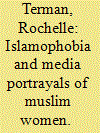

|
|
|
|
|
| Summary/Abstract |
This article examines portrayals of Muslim women in US news media. I test two hypotheses derived from theories of gendered orientalism. First, US news coverage of women abroad is driven by confirmation bias. Journalists are more likely to report on women living in Muslim and Middle Eastern countries if their rights are violated but report on women in other societies when their rights are respected. Second, stories about Muslim women emphasize the theme of women's rights violations and gender inequality, even for countries with relatively good records of women's rights. Stories about non-Muslim women, on the other hand, emphasize other topics. I test these hypotheses on data from thirty-five years of New York Times and Washington Post reporting using a structural topic model along with statistical analysis. The results suggest that US news media propagate the perception that Muslims are distinctly sexist. This, in turn, may shape public attitudes toward Muslims, as well as influence policies that involve Muslims at home and abroad.
|
|
|
|
|
|
|
|
|
|
|
|
|
|
|
|
| 11 |
ID:
157364
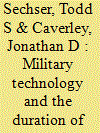

|
|
|
|
|
| Summary/Abstract |
Why do some civil conflicts end quickly, while others last for years? We argue that an incumbent government’s military forces play a crucial role in conflict duration. Specifically, combined arms militaries—which bring to bear a mixture of mechanized infantry, armor, and aircraft—make short conflicts more likely. The use of mechanized ground forces in combination with airpower increases the likelihood of decisive engagements early in a conflict, helping to mitigate information asymmetries that can drive violence. By contrast, less-mechanized forces face greater difficulty bringing the fight to the enemy. Combined arms militaries therefore tend to bring conflicts to more rapid conclusions. However, like maneuver warfare in conventional interstate conflict, these outcomes do not always favor incumbent governments. To test this argument, we employ new, detailed data on military mechanization and airpower from civil conflicts between 1967 and 2003. The results indicate that national militaries with high combined arms capabilities are associated with significantly shorter conflicts. Perhaps surprisingly, this relationship remains robust even when we limit the analysis to insurgencies.
|
|
|
|
|
|
|
|
|
|
|
|
|
|
|
|
| 12 |
ID:
157358


|
|
|
|
|
| Summary/Abstract |
English School theorists argue that primary institutions uphold order in international society. However, they disagree about what those primary institutions actually are. Moreover, comparatively little research tackles the links between primary institutions and secondary ones, embodied in international organizations. Yet, these different levels of international institutions contribute in specific ways to change and stability in international affairs. I argue for understanding primary institutions as practice-based and continuously discursively constructed. This allows us to explore how international organizations, although created by states, can themselves shape primary institutions. I illustrate my argument with examples from the United Nations (UN) Security Council. There are manifest tensions in the Security Council between, on the one hand, the evolving primary institution of great-power management and, on the other hand, the “frozen” secondary institution of membership rules. This has produced a lock-in of the primary institution. Indeed, we should recognize that such tension between institutions, rather than stability and harmony among them, reflects the normal state of affairs in international society.
|
|
|
|
|
|
|
|
|
|
|
|
|
|
|
|
| 13 |
ID:
157359
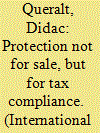

|
|
|
|
|
| Summary/Abstract |
How do rulers raise taxes when the fiscal capacity of the state is weak? I argue that, in conditions of low fiscal capacity, rulers might secure high tax yields by granting protection from competition to key domestic producers. I offer qualitative evidence of this exchange in the developing world today and test the theory against a sample of thirty-two developing states in Latin American, Eastern Europe, and the former Soviet Union circa 2005. Results indicate that, conditional on poor fiscal capacity, declining industries pay higher taxes (or evade less) if governments grant them tariff protection from international competitors. The results add to recent scholarship that studies the conditions under which entry barriers—which are otherwise inefficient institutions—result in second-best solutions for states whose capabilities are still consolidating. My findings suggest that trade protection does not always stem from rent-seeking by government. This article therefore offers a new, alternative hypothesis to canonical models in international political economy.
|
|
|
|
|
|
|
|
|
|
|
|
|
|
|
|
| 14 |
ID:
157361


|
|
|
|
|
| Summary/Abstract |
Rumors run rife in areas affected by political instability and conflict. Their adoption plays a key role in igniting many forms of violence, including riots, ethnic conflict, genocide, and war. While unverified at the time of transmission, some rumors are widely treated as truth, while others are dismissed as implausible or false. What factors lead individuals to embrace rumors and other forms of unverified information? This article presents a new theoretical framework for understanding individual receptivity to rumors and tests it using original survey data gathered in insurgency-affected areas of Thailand and the Philippines. We find wide variation in rumor adoption, and argue that three factors drive individuals to embrace rumors: worldview, threat perception, and prior exposure. Contrary to conventional wisdom, we find no evidence that commonly cited factors—including education, income, age, and gender—determine individual receptivity to rumors. We also explore the implications of belief in rumors on conflict dynamics. We find that greater receptivity to rumors correlates with the belief that ongoing conflict is intractable. This suggests that rumors can not only help spark political violence, but also impede its resolution. Our findings shed light on the complex interaction between worldview and unverified information in shaping popular beliefs—and through them, political contention and competition—in conflict areas and beyond.
|
|
|
|
|
|
|
|
|
|
|
|
|
|
|
|
| 15 |
ID:
157354


|
|
|
|
|
| Summary/Abstract |
Steam locomotives, a transformative transportation technology, experienced quick and wide adoption among major Western powers in the nineteenth century. However, when this technology reached East Asia later in the century, Japan enthusiastically adopted it while China did not. Why was this the case? This article investigates the difference in railroad technology adoption between late Qing China and Meiji-era Japan. Through analysis of historical accounts as well as original source documents, we argue that variations in concern for internal and external security were important determinants of the distinct adoption decisions. The Qing Court’s apprehension that technological change would lead to domestic social unrest and make China vulnerable to external threats deterred it from adopting railroads. In Japan, the Meiji leadership faced a less-pronounced internal and external threat environment. This allowed them to focus on the railroads’ potential to drive economic growth, consolidate administrative rule, and mobilize military resources. Our results suggest that perceptions regarding a technology’s expected effects may contribute more to technology adoption decisions than is suggested by the prevailing literature.
|
|
|
|
|
|
|
|
|
|
|
|
|
|
|
|
| 16 |
ID:
157349


|
|
|
|
|
| Summary/Abstract |
Many researchers assert that popular culture warrants greater attention from international relations scholars. Yet work regarding the effects of popular culture on international relations has so far had a marginal impact. We believe that this gap leads mainstream scholars both to exaggerate the influence of canonical academic sources and to ignore the potentially great influence of popular culture on mass and elite audiences. Drawing on work from other disciplines, including cognitive science and psychology, we propose a theory of how fictional narratives can influence real actors’ behavior. As people read, watch, or otherwise consume fictional narratives, they process those stories as if they were actually witnessing the phenomena those narratives describe, even if those events may be unlikely or impossible. These “synthetic experiences” can change beliefs, reinforce preexisting views, or even displace knowledge gained from other sources for elites as well as mass audiences. Because ideas condition how agents act, we argue that international relations theorists should take seriously how popular culture propagates and shapes ideas about world politics. We demonstrate the plausibility of our theory by examining the influence of the US novelist Tom Clancy on issues such as US relations with the Soviet Union and 9/11.
|
|
|
|
|
|
|
|
|
|
|
|
|
|
|
|
| 17 |
ID:
157365
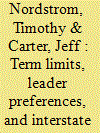

|
|
|
|
|
| Summary/Abstract |
Drawing on the idea that electoral accountability is a source for peace, recent scholarship claims that term limits result in democratic leaders who are systematically more likely to initiate conflicts. We consider a broader set of theoretical arguments that allow for the possibility that leaders’ preferences and the strategic environment condition the relationship between term limits and interstate conflict. These arguments suggest multiple hypothetical relationships between term limits and conflict, some of which are conditional on the hawkish or dovish nature of a leader’s preferences. Using a new, leader-year measure of term limits, we find that lame ducks—those incumbents legally prevented from serving as political executives in the following term—are less likely to initiate conflicts, on average, than their electorally accountable counterparts. This result holds among democratic leaders with dovish preferences but not democratic leaders with hawkish preferences, a finding consistent with theories of strategic conflict avoidance.
|
|
|
|
|
|
|
|
|
|
|
|
|
|
|
|
| 18 |
ID:
157353
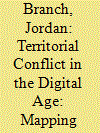

|
|
|
|
|
| Summary/Abstract |
This article examines the central, though understudied, role that a rapidly changing technology—mapping—plays in territorial conflict. As digital cartographic tools replace traditional paper maps, both the processes and outcomes of negotiation over territory change fundamentally. Digitization does not simply produce “better” maps that make settlements easier to reach. Instead, particular features of digital mapping reshape disputes over territory by altering the evaluation of possible solutions, changing the perceived value of territories, and bringing new actors into negotiation processes. Those effects are complex and context-sensitive. They promote conflict resolution in some circumstances but pose new obstacles to settlements in others. This article combines theory on mapping, negotiation, bargaining, and emotions in international relations. I first develop a set of general implications of digital mapping for the processes and outcomes of territorial negotiation. I then examine three illustrative cases: the 1995 Dayton Accords, the Eritrea-Ethiopia Boundary Commission, and the 2010 border dispute between Costa Rica and Nicaragua. In each case, new features of digital mapping yielded unexpected effects on negotiation and dispute-resolution processes.
|
|
|
|
|
|
|
|
|
|
|
|
|
|
|
|
| 19 |
ID:
157356


|
|
|
|
|
| Summary/Abstract |
How and on what grounds do international organizations allocate aid to their member states? I answer this question in the context of the International Atomic Energy Agency (IAEA). I find that political considerations affect the likelihood of receiving aid, as well as the amount of aid that countries receive. In particular, membership in the IAEA board of governors and the acceptance of tougher IAEA inspections increase the likelihood of IAEA assistance. These factors also increase the amounts of assistance, but only for countries with divergent policy preferences from those of the United States. In consequence, those states that receive IAEA assistance are not always those most in need of it. My findings track with theories that countries receive foreign aid in exchange for cooperation and concessions to donors.
|
|
|
|
|
|
|
|
|
|
|
|
|
|
|
|
|
|
|
|
|